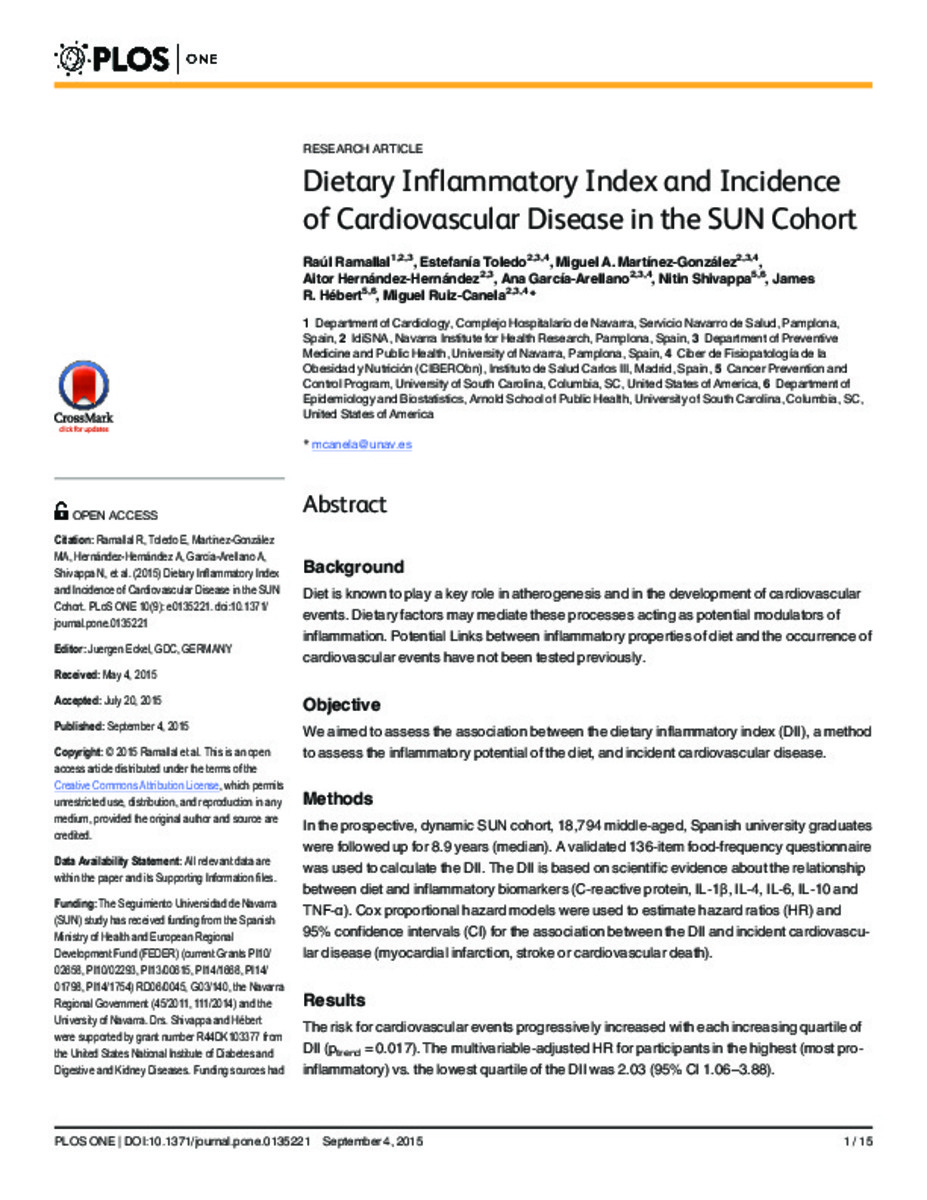Registro completo de metadatos
| Campo DC | Valor | Lengua/Idioma |
|---|---|---|
| dc.creator | Ramallal, R. (Raul) | - |
| dc.creator | Toledo, E. (Estefanía) | - |
| dc.creator | Martinez-Gonzalez, M.A. (Miguel Ángel) | - |
| dc.creator | Hernandez-Hernandez, A. (Aitor) | - |
| dc.creator | Garcia-Arellano, A. (Ana) | - |
| dc.creator | Shivappa, N. (Nitin) | - |
| dc.creator | Hebert, J.R. (James R.) | - |
| dc.creator | Ruiz-Canela, M. (Miguel) | - |
| dc.date.accessioned | 2015-09-16T07:37:23Z | - |
| dc.date.available | 2015-09-16T07:37:23Z | - |
| dc.date.issued | 2015 | - |
| dc.identifier.citation | Ramallal R, Toledo E, Martínez-González MA, Hernández-Hernández A, García-Arellano A, Shivappa N, et al. Dietary inflammatory index and incidence of cardiovascular disease in the SUN cohort. PLoS One. Sep 2015;10(9):e0135221. | es_ES |
| dc.identifier.issn | 1932-6203 | - |
| dc.identifier.uri | https://hdl.handle.net/10171/39020 | - |
| dc.description.abstract | BACKGROUND: Diet is known to play a key role in atherogenesis and in the development of cardiovascular events. Dietary factors may mediate these processes acting as potential modulators of inflammation. Potential Links between inflammatory properties of diet and the occurrence of cardiovascular events have not been tested previously. OBJECTIVE: We aimed to assess the association between the dietary inflammatory index (DII), a method to assess the inflammatory potential of the diet, and incident cardiovascular disease. METHODS: In the prospective, dynamic SUN cohort, 18,794 middle-aged, Spanish university graduates were followed up for 8.9 years (median). A validated 136-item food-frequency questionnaire was used to calculate the DII. The DII is based on scientific evidence about the relationship between diet and inflammatory biomarkers (C-reactive protein, IL-1β, IL-4, IL-6, IL-10 and TNF-α). Cox proportional hazard models were used to estimate hazard ratios (HR) and 95% confidence intervals (CI) for the association between the DII and incident cardiovascular disease (myocardial infarction, stroke or cardiovascular death). RESULTS: The risk for cardiovascular events progressively increased with each increasing quartile of DII (ptrend = 0.017). The multivariable-adjusted HR for participants in the highest (most pro-inflammatory) vs. the lowest quartile of the DII was 2.03 (95% CI 1.06-3.88). CONCLUSIONS: A pro-inflammatory diet was associated with a significantly higher risk for developing cardiovascular events. | es_ES |
| dc.description.sponsorship | Spanish Ministry of Health and European Regional Development Fund (FEDER) (current Grants PI10/ 02658, PI10/02293, PI13/00615, PI14/1668, PI14/ 01798, PI14/1754) RD06/0045, G03/140, the Navarra Regional Government (45/2011, 111/2014) and the University of Navarra. | - |
| dc.language.iso | eng | es_ES |
| dc.publisher | Public Library of Science | es_ES |
| dc.relation | info:eu-repo/grantAgreement/NIH/FP7/1R44DK103377-01 | - |
| dc.rights | info:eu-repo/semantics/openAccess | es_ES |
| dc.subject | SUN cohort | es_ES |
| dc.subject | Diet | es_ES |
| dc.subject | Inflammatory biomarkers | es_ES |
| dc.title | Dietary inflammatory index and incidence of cardiovascular disease in the SUN cohort | es_ES |
| dc.type | info:eu-repo/semantics/article | es_ES |
| dc.description.note | CC BY 4.0 | es_ES |
| dc.identifier.doi | http://dx.doi.org/10.1371/journal.pone.0135221 | es_ES |
Ficheros en este ítem:
Estadísticas e impacto
Los ítems de Dadun están protegidos por copyright, con todos los derechos reservados, a menos que se indique lo contrario.






